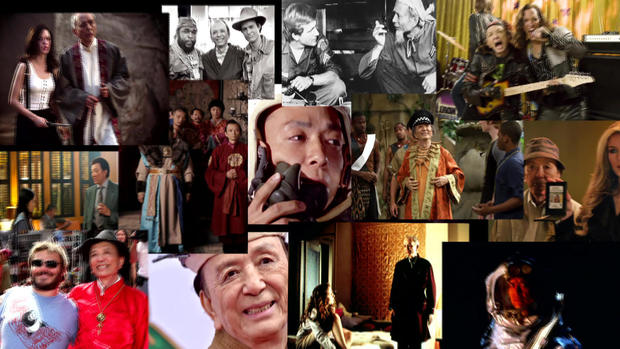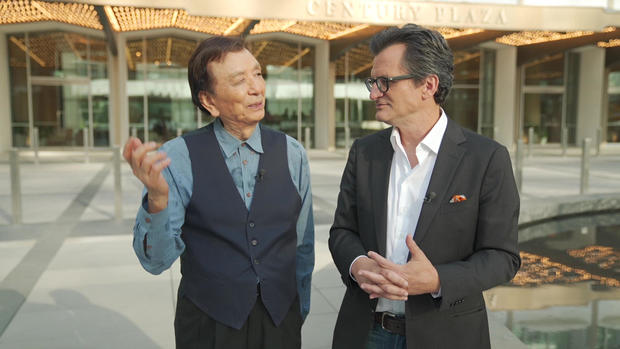A sitdown interview with James Hong can morph unexpectedly into an episode of “Dancing With the Character Actors.” “Should we dance a little?” Hong suggested. “You have to think, ‘This is a 92-year-old man,’ too!”
James Hong is no ordinary 92-year-old man. And while he can clearly cut the rug, what’s truly astounding is a Hollywood career currently in its 68th year.
“I’ve been an actor since 1953 or ’54,” he said. “Probably the only living guy that has worked with Groucho Marx!”
That’s where it began, with Groucho. Today, 445 screen credits later, Hong has been in “Chinatown,” “Blade Runner,” “Bonanza,” “The Big Bang Theory,” and a memorable episode of “Seinfeld.” The list goes on and on.
Turner Classic Movies host Ben Mankiewicz said, “You might have been in more TV and films than anyone else ever.”
“I would think so, for major movies and TV,” Hong replied. “There’s some guys that have been in stage plays and such.”
“Acch, who goes to plays?”
Forget the 445 credits – that he even has four credits is a tribute to his fierce determination.
CBS News
The son of Chinese immigrants, Hong was born in Minneapolis in 1929. “It was Chinatown. But in Minneapolis, Chinatown consists of two Chinese stores!”
“And one of ’em was your dad’s?”
“Yeah. He had an herb store, and we lived on the second floor.”
As a young boy, Hong didn’t speak much English. That made him a target in school: “I think my class was, you know, probably 500 kids. I was the only Asian student. So, the bullies would pick on me and beat me up so because, you know, bullies are bullies, right? They’ll pick on the underdog.”
Hong’s parents wanted him to be an engineer; that’s what he studied in college. Then, he was drafted to fight in the Korean War.
Mankiewicz asked, “What was it like to be a Chinese American in the Army?”
Hong said, “One of my Army fellow mates there said to me, ‘You know, James, I think you might have a problem, because if you are in an American Army outfit [and] charge the Koreans, they will shoot you because you’re an American. And if you retreat, the Americans will shoot you also, because they think you are a ‘gook’ dressed in an American outfit!’ So, he got me a little bit perturbed with that statement, you know?”
CBS News
Hong entertained troops by doing impressions. He got laughs … and then he got an idea. After the war, he moved to Los Angeles where he pursued his new dream: show biz.
A big break came when he appeared on Groucho Marx’s radio show, “You Bet Your Life”:
Marx: “Where are you from, Jim?”
Hong: “Minneapolis, Minnesota.”
Marx: “Minnesota! Listen, I thought you might be, because Hong is a fine, old Scandinavian name!”
Next came small parts on TV, often demeaning. He was the Chinese solider, the Chinese prisoner, and the guy running a Chinese laundry.
Mankiewicz said, “You didn’t play fully-rounded characters; you played stereotypes, and that’s it.”
“If you didn’t play the roles that were given to you, you would be not working at all,” said Hong. “And, so, in a sense, in order to keep up my craft, I had to take these roles as the Chinese railroad worker or laundryman and so forth.”
Though he was getting more work, Hong was also forced to confront racism. One incident still stings:
“That’s a very hurtful thing,” he sighed. “I was in London doing the son of Charlie Chan. J. Carrol Naish was Charlie Chan.”
Naish, who was of Irish ancestry, had to have his eyes made up daily to appear Oriental. “That got under his skin,” Hong said.
“So, one day he was on camera; I was off camera. I missed one line. He says, ‘What is this, a school for Chinese actors?’ And you know, I was shocked. I didn’t know what to do. He started to advance me. I had my fist clenched. I thought he was gonna slug me with something, you know? He walked past, and had me fired.
“And I went to his dressing room and apologized. I said, ‘I’m sorry, Mr. Naish, you know, I missed the line.’ He wouldn’t forgive me. He had me fired.”
Hong shrugged. “I don’t talk about it. it just hurts too much.”
Mankiewicz asked, “So, essentially he had you fired because you had the audacity to be of Chinese descent in a movie filled with Chinese people?’
“That’s right. I think he just was very prejudiced.”
By the 1970s, Hong had already amassed a few hundred credits, including playing Faye Dunaway’s butler in “Chinatown.” He’s also in the sci-fi cult classic “Big Trouble in Little China,” a role he happily recalls.
More recently, he’s been in every iteration of “Kung Fu Panda,” and this year Hong will receive a star on the Hollywood Walk of Fame.
He is a living character actor legend, and a champion for standing up against racism and fighting the stereotypes faced by Asian Americans in Hollywood and beyond.
Hong said, “In every role I played, I tried to make it a human being. And that’s why I think I kept working, because I think not only the studio, but the people saw that James was portraying a Chinese as a real person, and not just a cliché character.”
“It’s not easy to do, to impart humanity into a character that is written so stereotypically,” said Mankiewicz.
“Yes. That’s true.”
At 92, the characters keep coming. And Hong already has projects lined up to add to those 445 credits.
“Are you gonna retire?” asked Mankiewicz.
Hong replied by reciting: “Whether it is nobler in the mind that suffered the slings and arrows of outrageous fortune, to die… Okay, what was the question now?”
“I think we have our answer. You’re not retiring.”
“What’s that word?”
“I mean, if I were making a movie, I’d hire you for something. You’d be the first person I’d hire!”
“Yeah. Well, it has to be at least double scale, okay?”
“Well, then you’re out,” Mankiewcz laughed.
“I knew it!”
For more info:
Story produced by Gabriel Falcon. Editor: Joseph Frandino.
Download our Free App
For Breaking News & Analysis Download the Free CBS News app

